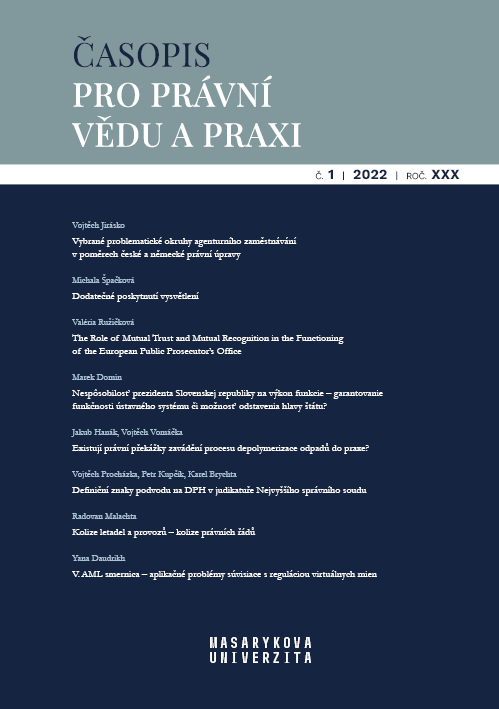Definiční znaky podvodu na DPH v judikatuře Nejvyššího správního soudu
Defining Characteristics of VAT Fraud in the Case-law of the Supreme Administrative Court
Author(s): Vojtěch Procházka, Petr Kupčík, Karel BrychtaSubject(s): Law on Economics, Commercial Law
Published by: Masarykova univerzita nakladatelství
Keywords: Case-Law;Czech Republic;Definig Characteristics;Supreme Administrative Court;VAT fraud;
Summary/Abstract: This paper provides the analysis and synthesis of the conclusions established by the case law of the Supreme Administrative Court of the Czech Republic which is related to the right to deduct VAT in connection with VAT tax fraud. In this respect, the case law of the CJEU still undoubtedly plays a very important (if not directly crucial) role. However, it is worth noting that despite the set boundaries and established rules, the Member States have a considerable degree of discretion, and furthermore, the specifics of individual cases need to be taken into account in particular cases, which is also stressed by the Supreme Administrative Court of the Czech Republic itself. The intention of this article was to map the recent case law of the Supreme Administrative Court of the Czech Republic in relation to the defining characteristic of the VAT fraud. The research carried out was aimed at the following defining characteristics of VAT fraud: the subjective aspect of participation in the fraud and the measures taken by the tax entity; the defining characteristic of missing tax and the defining characteristics of the entity that can be denied the right to deduct VAT within the supply chain. In summary, it can be generally stated that the conclusions established in the selected judgments of the Supreme Administrative Court of the Czech Republic can be considered consistent and logical, and at the same time those which are undergoing certain developments (connected, inter alia, with the reflection of the new case law of the CJEU). The current case law now provides an extensive, but of course still only demonstrative, list of the basic factors that can be considered as harmful when speaking of bearing the burden of proof on the part of the subject. In this respect, the case law undoubtedly provides some guidance to payers. It can be concluded that the case law of the Supreme Administrative Court has established relevant boundaries for the tax authorities; also in the meaning of defining (specifying) to which tax authorities are not obliged in relation to proving tax subject’s participation in VAT fraud. From the perspective of theory and practice, there is a need to point out to an interesting, complex and problematic feature: a definition of the subject that can be negatively impacted within the supply chain. In this respect, the case law of the Supreme Administrative Court of the Czech Republic has undergone a certain development in the last three years; which seems to be more beneficial for tax authorities.
Journal: Časopis pro právní vědu a praxi
- Issue Year: 30/2022
- Issue No: 1
- Page Range: 153-174
- Page Count: 22
- Language: Czech

